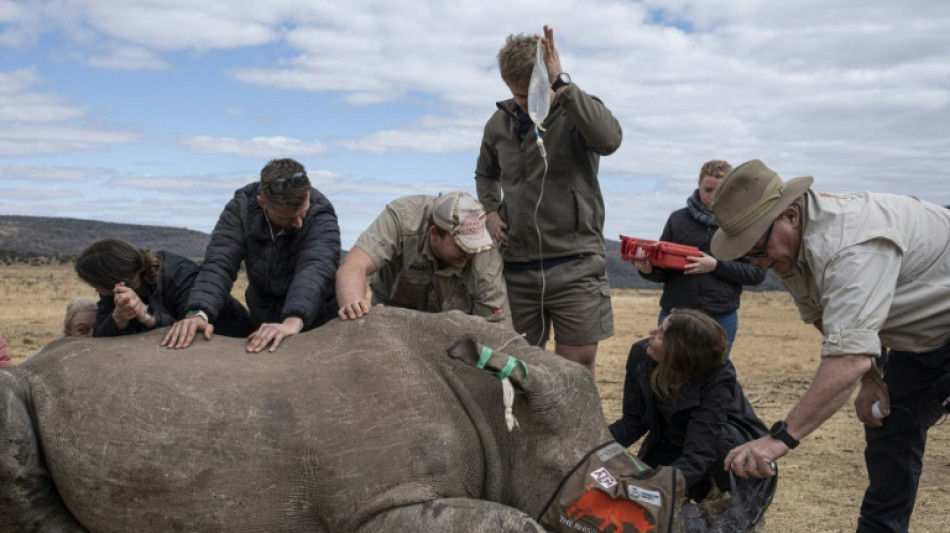
-
 Novo Nordisk's obesity drug Wegovy goes on sale in China
Novo Nordisk's obesity drug Wegovy goes on sale in China
-
Spain royals to visit flood epicentre after chaotic trip: media

-
 French farmers step up protests against EU-Mercosur deal
French farmers step up protests against EU-Mercosur deal
-
Rose says Europe Ryder Cup stars play 'for the badge' not money

-
 Negotiators seek to break COP29 impasse after G20 'marching orders'
Negotiators seek to break COP29 impasse after G20 'marching orders'
-
Burst dike leaves Filipino farmers under water

-
 Markets rally after US bounce as Nvidia comes into focus
Markets rally after US bounce as Nvidia comes into focus
-
Crisis-hit Thyssenkrupp books another hefty annual loss

-
 US envoy in Lebanon for talks on halting Israel-Hezbollah war
US envoy in Lebanon for talks on halting Israel-Hezbollah war
-
India to send 5,000 extra troops to quell Manipur unrest

-
 Sex, drugs and gritty reality on Prague's underworld tours
Sex, drugs and gritty reality on Prague's underworld tours
-
Farmers descend on London to overturn inheritance tax change

-
 Clippers upset Warriors, Lillard saves Bucks
Clippers upset Warriors, Lillard saves Bucks
-
Acquitted 'Hong Kong 47' defendant sees freedom as responsibility

-
 Floods strike thousands of houses in northern Philippines
Floods strike thousands of houses in northern Philippines
-
Illegal farm fires fuel Indian capital's smog misery

-
 SpaceX set for Starship's next flight, Trump expected to attend
SpaceX set for Starship's next flight, Trump expected to attend
-
Texans cruise as Cowboys crisis deepens

-
 Do the Donald! Trump dance takes US sport by storm
Do the Donald! Trump dance takes US sport by storm
-
Home hero Cameron Smith desperate for first win of 2024 at Australian PGA

-
 Team Trump assails Biden decision on missiles for Ukraine
Team Trump assails Biden decision on missiles for Ukraine
-
Hong Kong court jails 45 democracy campaigners on subversion charges

-
 Several children injured in car crash at central China school
Several children injured in car crash at central China school
-
Urban mosquito sparks malaria surge in East Africa

-
 Djibouti experiments with GM mosquito against malaria
Djibouti experiments with GM mosquito against malaria
-
Pulisic at the double as USA cruise past Jamaica

-
 Many children injured after car crashes at central China school: state media
Many children injured after car crashes at central China school: state media
-
Asian markets rally after US bounce as Nvidia comes into focus

-
 Tens of thousands march in New Zealand Maori rights protest
Tens of thousands march in New Zealand Maori rights protest
-
Five takeaways from the G20 summit in Rio

-
 China, Russia ministers discuss Korea tensions at G20: state media
China, Russia ministers discuss Korea tensions at G20: state media
-
Kohli form, opening woes dog India ahead of Australia Test series

-
 Parts of Great Barrier Reef suffer highest coral mortality on record
Parts of Great Barrier Reef suffer highest coral mortality on record
-
Defiant Lebanese harvest olives in the shadow of war

-
 Russian delegations visit Pyongyang as Ukraine war deepens ties
Russian delegations visit Pyongyang as Ukraine war deepens ties
-
S.Africa offers a lesson on how not to shut down a coal plant

-
 Italy beat Swiatek's Poland to reach BJK Cup final
Italy beat Swiatek's Poland to reach BJK Cup final
-
Japan, UK to hold regular economic security talks

-
 Divided G20 fails to agree on climate, Ukraine
Divided G20 fails to agree on climate, Ukraine
-
Can the Trump-Musk 'bromance' last?

-
 US to call for Google to sell Chrome browser: report
US to call for Google to sell Chrome browser: report
-
Macron hails 'good' US decision on Ukraine missiles

-
 Italy eliminate Swiatek's Poland to reach BJK Cup final
Italy eliminate Swiatek's Poland to reach BJK Cup final
-
Trump expected to attend next Starship rocket launch: reports

-
 Israeli strike on Beirut kills 5 as deadly rocket fire hits Israel
Israeli strike on Beirut kills 5 as deadly rocket fire hits Israel
-
Gvardiol steals in to ensure Croatia reach Nations League quarter-finals

-
 Thousands march to New Zealand's parliament in Maori rights protest
Thousands march to New Zealand's parliament in Maori rights protest
-
China's Xi urges G20 to help 'cool' Ukraine crisis

-
 Church and state clash over entry fee for Paris's Notre Dame
Church and state clash over entry fee for Paris's Notre Dame
-
Holders Spain strike late to beat Switzerland in Nations League


First radioactive rhino horns to curb poaching in S.Africa
South African scientists on Tuesday injected radioactive material into live rhino horns to make them easier to detect at border posts in a pioneering project aimed at curbing poaching.
The country is home to a large majority of the world's rhinos and as such is a hotspot for poaching driven by demand from Asia, where horns are used in traditional medicine for their supposed therapeutic effect.
At the Limpopo rhino orphanage in the Waterberg area, in the country's northeast, a few of the thick-skinned herbivores grazed in the low savannah.
James Larkin, director of the University of the Witwatersrand's radiation and health physics unit who spearheaded the initiative, told AFP he had put "two tiny little radioactive chips in the horn" as he administered the radioisotopes on one of the large animals' horns.
The radioactive material would "render the horn useless... essentially poisonous for human consumption" added Nithaya Chetty, professor and dean of science at the same university.
The dusty rhino, put to sleep and crouched on the ground, did not feel any pain, Larkin said.
The radioactive material's dose was so low it would not impact the animal's health or the environment in any way, he said.
In February the environment ministry said that, despite government efforts to tackle the illicit trade, 499 of the giant mammals were killed in 2023, mostly in state-run parks. This represents an 11 percent increase over the 2022 figures.
Twenty live rhinos in total would be part of the pilot Rhisotope project whereby they would be administered a dose "strong enough to set off detectors that are installed globally" at international border posts originally installed "to prevent nuclear terrorism", a pleased Larkin said, sporting a green hat and a khaki shirt.
Border agents often have handheld radiation detectors which can detect contraband in addition to thousands of radiation detectors installed at ports and airports, the scientists said.
-'Best idea'-
Rhino horns are highly sought after on black markets, where the price by weight rivals that of gold and cocaine.
According to Arrie Van Deventer, the orphanage's founder, dehorning the rhino and poisoning the horns have failed to deter poachers.
"Maybe this is the thing that will stop poaching", the tall, slim-built conservationist said. "This is the best idea I've ever heard".
Wildebeest, warthogs and giraffe roamed the vast conservation area as more than a dozen team members performed the delicate process on another rhino.
Larkin meticulously drilled a small hole into the horn, hammered in the radioisotope, then finished off by spraying 11,000 microdots all over the horn.
About 15,000 rhinos live in the southern African nation, according to an estimate by the international Rhino foundation.
The last phase of the project would be the animal's aftercare following "proper scientific protocol and ethical protocol", said the project's COO, a bubbly Jessica Babich.
The team would then take follow-up blood samples to ensure the rhinos were effectively protected.
The material would last five years on the horn, which was cheaper than dehorning every 18 months, Larkin said.
A.Taylor--AT

